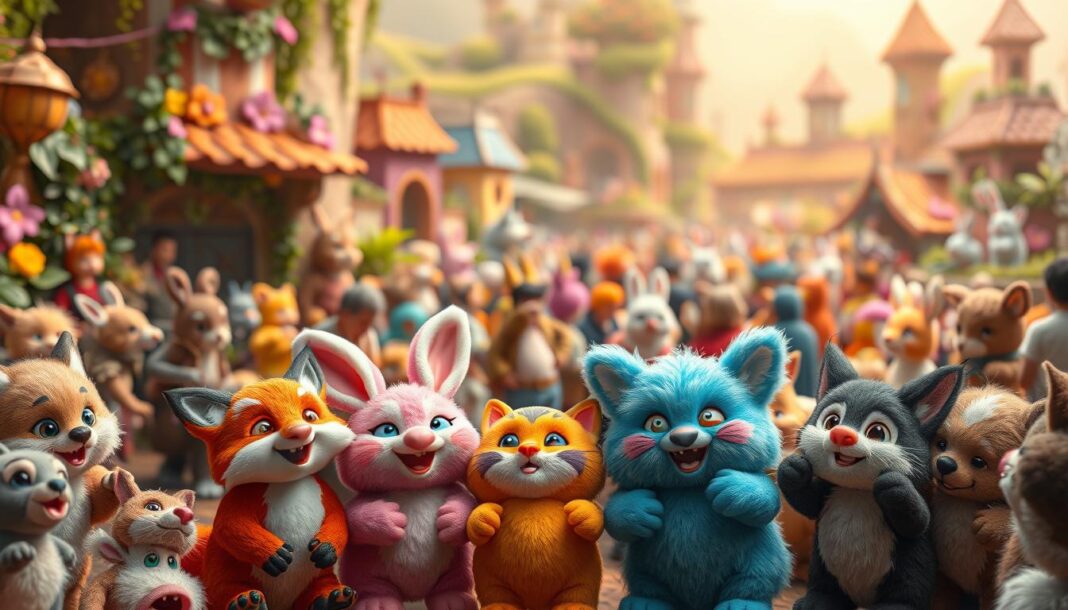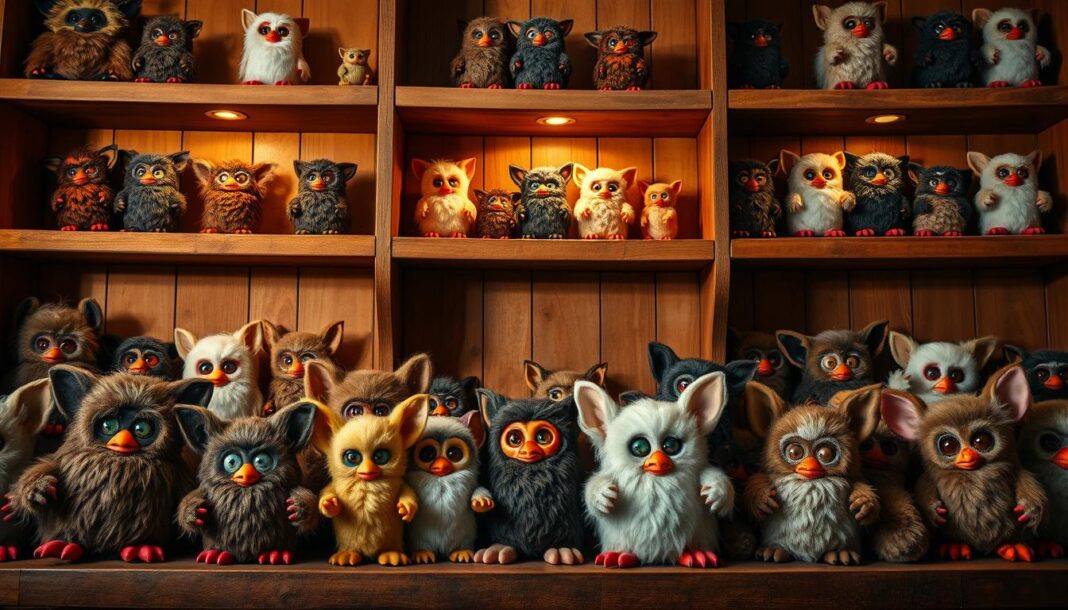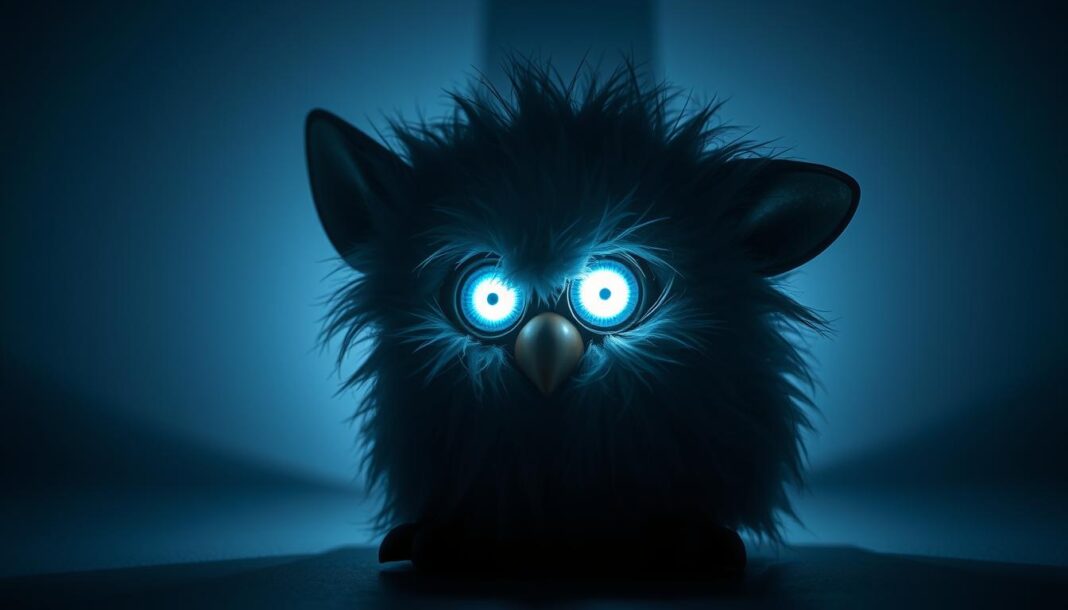Many online searches for “furby person” actually refer to the furry fandom. This global community celebrates anthropomorphic animals—characters blending human and animal traits. Research from the International Anthropomorphic Research Project confirms over 95% of members create unique “fursonas” as personal avatars.
The furry community thrives on creativity and inclusivity. Studies reveal 70% identify as LGBTQ+, challenging mainstream stereotypes. Events like Anthrocon boost local economies, generating millions for host cities.
Misconceptions often overshadow facts. While media focuses on costumes, furries engage in art, writing, and social activism. Only 15-25% own fursuits, yet the fandom’s cultural impact grows yearly.
This guide explores origins, activities, and truths behind the vibrant world of anthropomorphic enthusiasts. Let’s separate myths from peer-reviewed findings.
What Is a Furry Person? Defining the Fandom
Fursonas—personalized animal avatars—define the furry community’s identity. These original characters blend human and animal traits, with 95% of members crafting unique personas. Unlike cosplay, which recreates existing figures, fursonas express individuality through anthropomorphic designs.
Anthropomorphism and Furry Identity
Giving human qualities to animals fuels the fandom’s creativity. Wolves with musical talent or foxes solving mysteries exemplify this art style. Studies show 60% prefer carnivorans like wolves, reflecting cultural fascination with wild characters.
Furscience research highlights psychological benefits. Inventing a fursona aids self-expression, especially among LGBTQ+ members. Surprisingly, 78% never own full costumes, debunking media stereotypes.
Furry vs. Therian: Key Differences
While both groups engage with animal traits, they diverge fundamentally:
| Furries | Therians |
|---|---|
| Artistic subculture | Spiritual/psychological identity |
| Create fursonas (95%) | Feel innate connection to species |
| Participate in conventions | Focus on personal awakening |
| Hybrid designs common | Identify as one specific animal |
Confusion sometimes arises with otherkin communities, but furries focus on artistry, not belief systems. Plushophilia misconceptions also misrepresent the community’s values.
The Origins and Evolution of the Furry Fandom
The 1980s sci-fi scene unexpectedly birthed a thriving subculture centered on animal characters. Discussions at sci-fi conventions planted early seeds, evolving into a global phenomenon by the 1990s.
Early Influences: Cartoons and Literature
Classics like Kimba the White Lion (1965) and Watership Down (1972) popularized anthropomorphic storytelling. These media icons inspired fans to create original hybrids of human and animal traits.
Underground zines, like those by the Vootie collective, expanded adult-themed art in the 1980s. This DIY culture laid groundwork for today’s digital artistry.
From Sci-Fi Conventions to Global Community
Confurence #0 (1989) marked the first dedicated furry convention, drawing 500 fans. By 2008, Anthrocon attracted 5,861+ attendees—proof of explosive growth.
| Milestone | Impact |
|---|---|
| 1980s Zine Culture | Fostered early art exchanges |
| 1990s MUCK/MUD Platforms | Enabled virtual roleplaying hubs |
| 2016’s Zootopia | Mainstreamed furry appeal |
| Tech Industry Ties | 30%+ work in IT (source) |
Webcomics like Kevin and Kell (award-winning) further united the international anthropomorphic community. Today, furry events generate millions for host cities, proving cultural staying power.
Furry Activities and Creative Expressions
From digital art to elaborate costumes, furries channel their passions in diverse ways. The fandom’s interests span artistry, role-playing, and philanthropy, creating a dynamic subculture.
Fursonas: Crafting an Anthropomorphic Avatar
Designing a fursona takes six months on average. Members blend animal traits with human qualities, crafting a unique character for self-expression. Wolves, foxes, and hybrids dominate these creations.
Fursuits vs. Cosplay: Purpose and Distinctions
Only 45% of convention attendees own partial or full suits. Simple ears/tails cost $300, while animatronic suits exceed $2,500. Unlike cosplay, fursuits represent original personas, not existing media figures.
Art, Role-Playing, and Online Communities
Platforms like FurAffinity host millions of artwork pieces. Furry conventions feature parades, auctions, and puppet shows—Rapid T. Rabbit’s family-friendly acts draw crowds. Since 1990, FurryMUCK has anchored role-playing content.
Charity drives highlight the fandom’s heart. Events raised $470K (2000–2009) for animal welfare and LGBTQ+ causes. Award-winning shows like Beastars prove the subculture’s creative impact.
Debunking Myths: Misconceptions About Furries
Urban legends about furries persist despite clear evidence to the contrary. The media often amplifies false claims, creating distorted perceptions of this creative group. Let’s examine the facts behind two major controversies.
The “Litter Box” Hoax and Media Sensationalism
In 2022, viral claims suggested schools installed litter boxes for people identifying as animals. Multiple districts issued public denials, including Lansing Public Schools’ official statement.
Furscience’s convention observations confirm zero litter box installations across 15 years of events. This hoax originated from satire sites before being misreported as fact.
Separating Fact from Fiction on Furry Sexuality
While 96% of male furries view furry porn (vs. 78% females), sexuality isn’t the fandom’s focus. Research shows only 24% consider it a primary aspect of furry life.
| Myth | Fact |
|---|---|
| Fursuits are sexual | Less than 1% use due to heat/cleaning issues |
| High zoophilia rates | 2% interest (matches general population) |
| No consent culture | All major cons enforce strict anti-harassment policies |
The International Anthropomorphic Research Project’s 4,300-person study clarifies distinctions. Therians feel spiritual animal connections, while zoophiles focus on bestiality—a rejected term in furry spaces.
For deeper insights into community values, explore our guide on furry meaning and symbolism.
Furry Conventions: More Than Just Costumes
Global furry conventions transform cities into vibrant hubs of creativity and commerce. These events unite thousands of members worldwide, blending artistry with economic impact. Beyond fursuits, conventions fuel local businesses and philanthropic causes.
Anthrocon and Other Major Gatherings
Anthrocon dominates as the largest event, injecting $3M into Pittsburgh annually. Midwest FurFest set records with 11,019 attendees in 2019. Eurofurence attracts European fans with hybrid virtual/in-person formats.
Unique activities define each gathering:
- Fursuit hockey tournaments at Further Confusion
- Charity auctions featuring custom artwork
- Themed restaurant menus (Pittsburgh’s “Fuzzy Brunch”)
Charity Work and Economic Impact
Since 2000, community fundraisers donated $470K+ to animals and LGBTQ+ groups. 2023 partners included Pawsible Rescue and The Trevor Project.
| Convention | Economic Impact | Charity Focus |
|---|---|---|
| Anthrocon | $3M/year | Local animal shelters |
| Midwest FurFest | $1.8M (2019) | Mental health initiatives |
| Eurofurence | €500K+ | Wildlife conservation |
Dealers Den artist alleys generate $10K+ per vendor. Hotels report 90% occupancy during events, proving the fandom’s financial clout.
The Social and Psychological Aspects of Being a Furry
Research reveals surprising mental health patterns within the furry community. Despite facing higher bullying rates, members report equal life satisfaction compared to non-furries. This resilience stems from the fandom’s unique support systems and creative outlets.
Inclusivity and LGBTQ+ Representation
The fandom welcomes diverse identities with open paws. Studies show 70% identify as LGBTQ+—35 times higher than general populations. Transgender members particularly thrive, representing 25% versus 1% nationally.
Mutual aid networks on platforms like Twitter provide tangible support. During the 2016 Vancouver refugee crisis, local furries organized housing for displaced people. Such efforts reflect the community’s core values of acceptance.
Fandom as a Safe Space for Self-Discovery
Creating a fursona helps 63% manage social anxiety, per the research project data. These avatars allow exploring different ages, genders, and personalities safely. About 40% design fursonas older or younger than themselves.
Potential risks exist—12% report excessive escapism. However, dedicated crisis hotlines and furry-specific mental health resources help maintain balance. The table below compares key psychological factors:
| Aspect | Furry Community | General Population |
|---|---|---|
| LGBTQ+ Identification | 70% | 7.1% (Gallup 2022) |
| Autism Spectrum | 15% | 2.2% (CDC) |
| Bullying Victims | 2x Higher | 20% (NCES) |
| Life Satisfaction | Equal | Equal |
For many, the community feels like finding lifelong friends. As one member shared: “My fursona gave me courage to come out—it was practice for real life.” This transformative power keeps the fandom growing.
Furries in the Digital Age: Technology and Subculture
Technology reshapes how furries connect and create worldwide. The community thrives at the intersection of creativity and code, with 30% working in tech fields according to recent surveys. From open-source designs to virtual meetups, digital tools expand furry expression beyond physical limits.
Why IT Professionals Are Overrepresented
Development teams within the fandom build specialized platforms like FurAffinity’s Elasticsearch system. The research project data suggests tech careers appeal to furries for three key reasons:
- Problem-solving matches creative worldbuilding
- Remote work accommodates convention travel
- Online collaboration mirrors fandom social structures
Open-source communities share fursuit CAD files, while crypto initiatives like Pawthereum raise funds for animal charities. These projects showcase the fandom’s technical characteristics.
Virtual Meetups and the Pandemic’s Impact
When physical gatherings paused, VR Chat furry worlds hosted 500+ daily visitors. The 2021 Furality online convention drew 8,000 attendees—proof of digital resilience. Key shifts during this time included:
| Platform | Growth | Innovation |
|---|---|---|
| Discord | 300% server increase | Hybrid event coordination |
| VRChat | 200+ custom avatar shops | Interactive furry worlds |
| Twitch | $10K/month fursuit streams | Live character performances |
RFID badge systems now enhance convention cybersecurity, reflecting the international anthropomorphic community’s tech adaptation. As Decentraland develops furry districts, the fandom pioneers metaverse integration—blending artistry with cutting-edge tools.
Understanding the Furry Community’s Future
Generation Z reshapes furry culture with digital-first creativity. Over 88% of members are under 30, driving 12% annual growth. VR suits with haptic feedback and eco-friendly fursuit materials reflect younger members’ values. Universities now offer 22 courses on anthropomorphic studies, signaling lasting academic interest.
Corporate engagement grows—Microsoft patents furry emojis, while Asia-Pacific conventions expand. Legal debates over fursona ownership and vintage collectible toys spark new discussions. For many, the fandom feels like home, blending tradition with innovation.


